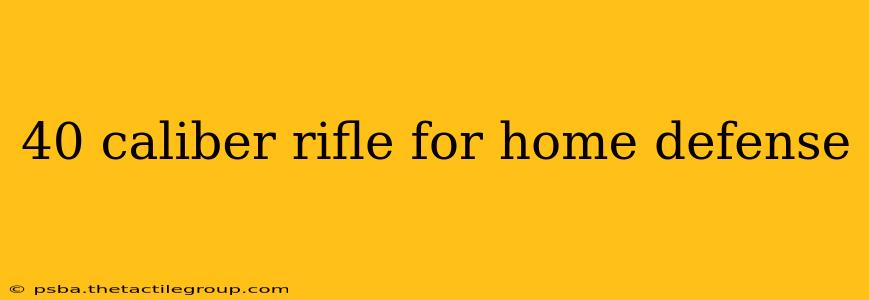Choosing the right firearm for home defense is a crucial decision, demanding careful consideration of various factors. While shotguns and handguns are popular choices, the .40 caliber rifle offers a compelling alternative, balancing firepower, manageable recoil, and ammunition availability. This guide dives deep into the viability of a .40 caliber rifle for home defense, exploring its pros and cons, and providing insights to help you make an informed choice.
Understanding the .40 Caliber Cartridge
Before delving into rifles, understanding the .40 S&W cartridge itself is paramount. Developed in the early 1990s, the .40 S&W is a relatively powerful handgun cartridge designed for law enforcement and civilian self-defense. Its larger diameter and heavier bullet compared to 9mm offer increased stopping power, making it a popular choice. However, this power comes at the cost of slightly higher recoil. The application of this cartridge in a rifle platform introduces a unique set of considerations.
.40 Caliber Rifles: Pros and Cons for Home Defense
While not as common as AR-15s or shotguns, .40 caliber rifles exist, often utilizing carbine-length platforms. Let's weigh the advantages and disadvantages:
Advantages:
- Stopping Power: The .40 S&W cartridge offers greater stopping power than many handgun rounds, potentially leading to faster incapacitation of a threat.
- Accuracy: Compared to handguns, rifles generally boast superior accuracy, allowing for more precise shots at longer ranges—a crucial factor in a home defense scenario where distances may vary.
- Ammunition Availability: .40 S&W ammunition is widely available, easing concerns about supply during emergencies. This shared ammunition with handguns can also simplify logistics for those already using .40 caliber handguns.
- Manageable Recoil (Generally): While more powerful than 9mm, the recoil of a .40 caliber rifle is usually manageable for most shooters, especially with proper training and technique.
Disadvantages:
- Overpenetration: The .40 S&W's power can lead to significant overpenetration, posing a risk to occupants in adjacent rooms or even neighboring structures. Careful shot placement is paramount.
- Capacity Limitations: Compared to AR-15 style platforms, .40 caliber rifles typically have smaller magazine capacities.
- Less Common: The relative scarcity of .40 caliber rifles may limit your choices, making finding the right firearm potentially more challenging.
- Cost: Ammunition and firearms may be more expensive than some other options, such as 9mm.
Choosing a .40 Caliber Rifle for Home Defense: Key Factors
If you're considering a .40 caliber rifle for home defense, carefully consider these aspects:
- Accuracy and Reliability: Choose a rifle known for its accuracy and reliable function under stress. Thorough research and potentially testing different models at a range are advisable.
- Ergonomics and Handling: Ensure the rifle feels comfortable and easy to handle, even under duress. Practice with the firearm to build familiarity and confidence.
- Home Layout: Consider your home's layout and potential engagement distances when selecting your firearm.
- Training: Proper training is crucial for any home defense firearm, and even more so for a less-common caliber like .40 S&W in a rifle.
Alternatives to Consider
While the .40 caliber rifle presents some compelling features, it's wise to explore alternatives:
- 9mm Carbines: Offer a good balance of manageable recoil, capacity, and affordability.
- Shotguns: Remain a highly effective home defense option, offering devastating stopping power at close range. However, they also present a higher risk of overpenetration.
- AR-15 Platforms in 5.56 or .223: Widely available, highly customizable, and offer significant capacity.
Conclusion
A .40 caliber rifle can be a viable option for home defense, particularly for those who already utilize .40 caliber handguns. However, it's essential to carefully weigh the pros and cons, understand the potential risks of overpenetration, and invest in comprehensive training. Ultimately, the best choice depends on individual needs, circumstances, and preferences. Consulting with experienced firearm professionals and engaging in thorough research is crucial before making this significant decision. Remember, responsible gun ownership is paramount.

